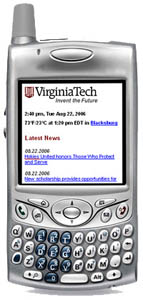|
 NEWS NEWS
Get Tech news now on your cell phone or PDA -|- Want up-to-the minute news about Virginia Tech? Sign up for Virginia Tech Mobile, a new service that delivers the latest university news and information to cellular phones or personal digital assistants (PDAs). This new service gives users immediate access to the latest news and information on significant research, achievements, and projects and programs, as well as important campus notices, emergency- or weather-related announcements, current weather conditions in Blacksburg, and a comprehensive listing of campus events. To access Virginia Tech Mobile, simply enter http://mobile.vt.edu in the Web browser of your mobile device.
|
|
Transferring to Tech a growing trend
Virginia Tech welcomed more transfer students this fall than ever before, with approximately half of them coming from Virginia's community colleges. Topping the university's previous high of 755 transfer students in 2005, the university enrolled 825 students transferring from other colleges and universities. This represents an upward trend, following an 8 percent increase in 2005 from the previous year. Tech's transfer applicant pool has numbered just over 2,700 each year since 2002. However, an increase each year in the strength of the applicants' academic credentials has resulted in more offers and more transfer students enrolling. In 2002, 619 transfer students enrolled (from a pool of 2,768 applicants), compared to 825 in 2006 (from a pool of 2,716 applicants). In addition to a long-standing equivalency table of Virginia Community College System (VCCS) and Virginia Tech courses, the university is writing formal guaranteed-admission agreements with VCCS. Currently, Virginia Tech has similar agreements in agriculture and life sciences and, with six community colleges, in engineering.
|

|
|
|
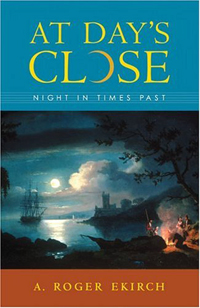 |
Award-winning history -|- Professor of early American history Roger Ekirch received the 2006 Charles Smith Award for his book At Day's Close: Night in Times Past, which examines the history of nocturnal activity before the dawn of the Industrial Revolution and electrical lighting. The Smith Award is presented in even-numbered years by the European History Section of the Southern Historical Association for the best book on European history published during the past two years. Ekirch also was honored by the Library of Virginia with the 2006 Literary Award for the best work of nonfiction. Based on 20 years of detailed archival research, ****At Day's Close: Night in Times Past (W.W. Norton, 2005) is a compelling study of the darker side of human history.
|
|
|
| Incoming first-year students most competitive yet -|- Virginia Tech's Class of 2010 boasts the best high school credentials of any freshman class at the university. Of the 19,046 students who applied for fall admission--an 8 percent increase over the 17,687 who applied in 2005--the approximately 5,000 first-year students, more than 100 of whom are high school valedictorians or salutatorians, have an average high school grade point average (GPA) of 3.74 (with a middle 50 percent of 3.38 to 3.95 GPA), up from 3.72 last year. The class' combined SAT math and critical reading score is 1201, two points less than last year's 1203, which follows this year's nationwide trend of lower SAT scores. In a departure from the national trend, the class is 45 percent female and 55 percent male. In addition, in-state students account for 70.5 percent, with 29.5 percent representing 49 states, the District of Columbia, Puerto Rico, the U.S. Virgin Islands, and 36 foreign countries. |
|
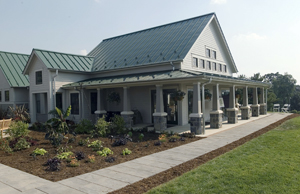 |
|
New garden pavilion at Hahn Garden
This summer, the university dedicated its new garden pavilion, located at the Hahn Horticulture Garden, in honor of Peggy Lee Hahn, wife of Virginia Tech President Emeritus T. Marshall Hahn. The pavilion and the garden were named in Mrs. Hahn's honor because of her enthusiasm for gardening and to recognize her outstanding service as Virginia Tech's first lady from 1962 to 1974. The Hahns pledged a $1 million estate gift and $475,000 in start-up funds for the expansion of the garden in 2004.
|
|
| Engineering and business programs nationally ranked -|- Two of Tech's undergraduate programs were ranked in U.S. News & World Report's "America's Best Colleges 2007” survey released in August. The College of Engineering shared 17th with Texas A&M, slipping one spot from last year, when they were tied with two schools at 14th. Tech and Texas A&M also shared the ninth slot among engineering schools at public universities. The Pamplin College of Business was ranked 37th overall and 22nd among business programs at public universities, bettering last year's ranking of 40th overall and 24th among public institutions. Among all national universities, Virginia Tech moved forward one ranking slot, sharing 77th with Stevens Institute of Technology, St. Louis University, and the University of Colorado-Boulder. Among publicly funded universities, Tech ranked 34th. |
|
 |
Psychology professor named to national committee -|- Professor of Psychology Russell Jones was nominated by U.S. Department of Education Secretary Margaret Spellings to serve on the Safe and Drug-Free Schools and Communities Advisory Committee. The committee supports programs that prevent school violence and the illegal use of alcohol, tobacco, and drugs; involve parents and community; and foster a safe and drug-free learning environment that promotes academic achievement. Jones, an expert on the psychological effects of trauma on children, served as special counsel to first lady Laura Bush on a visit to hurricane-ravaged areas of the Gulf Coast. |
 |
Interim dean of CAUS appointed -|- Following College of Architecture and Urban Studies (CAUS) Dean Paul Knox's decision to return to teaching and research, Reynolds Metals Endowed Professor of Architecture A.J. "Jack" Davis was named interim dean of CAUS on July 1. The associate dean for academic affairs and a professor in the professional program in architecture, Davis has been principal and co-principal investigator on more than $2.5 million in research grants. Led by Provost Mark McNamee, the search for a permanent dean began in August. |
|
| Get the latest Tech News-
For more Virginia Tech news featuring the latest campus news stories; important campus notices; a comprehensive listing of each day’s events and activities; campus snapshots and photographs; podcasts and video streams; sports headlines and weather updates; the latest faculty, staff, and student awards; and a new section, "Virginia Tech in the News," go to Virginia Tech News at www.vtnews.vt.edu.
Virginia Tech News also features a daily e-mail that is delivered to your computer every morning, Monday through Friday. Several stories and campus notices are featured in each daily e-mail, which directs you to the Virginia Tech News website for additional information. To receive the daily e-mail, you must subscribe to this service. For instructions, go to www.vtnews.vt.edu/email.php.
|
|
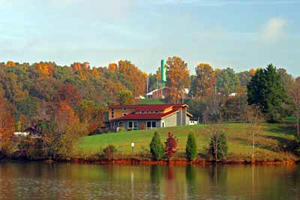 |
|
4-H center celebrates 40th anniversary
The W.E. Skelton 4-H Educational Conference Center at Smith Mountain Lake celebrated 40 years of service on June 29 with the official opening and dedication of the Willard Amphitheatre. Donated by center board member Ron Willard, the new amphitheatre, which serves as a focal point for the 120-acre campus, is designed for multiple uses and has permanent seating for more than 400 youth and 1,000 adults. The center, which serves 19 counties and cities in central and western Virginia, has been called America’s leading 4-H center.
|
|
| Doctoral student appointed White House Fellow -|- Jeffrey Daniel Stern, a public administration doctoral student in the College of Architecture and Urban Studies, is one of 14 individuals nationwide to be named a White House Fellow by President George W. Bush. Stern, a certified emergency manager, is a member of the Arlington County (Va.) Fire Department and serves as deputy coordinator of emergency services in the Arlington County Office of Emergency Management. Founded in 1964 by President Lyndon B. Johnson, the White House Fellows Program is one of the nation's most prestigious and competitive programs for leadership and public service. For more information, go to www.whitehouse.gov/fellows.
|
|
|
| Search for prisoner halts first day of classes
The first day of the fall semester was brought to a jarring halt on Monday, Aug. 21, when the manhunt for escaped convict and suspected killer William Morva prompted university officials to cancel classes late that morning. Morva, an inmate in the Montgomery County Jail charged with attempted armed burglary, had been taken to the Montgomery Regional Hospital in the early morning on Aug. 20. There, he allegedly overpowered a sheriff's deputy and fatally shot Derrick McFarland, a hospital security guard, before escaping. On the morning of Aug. 21, Morva also allegedly shot and killed Montgomery County Sheriff's Office Cpl. Eric E. Sutphin on the Huckleberry Trail. That afternoon, authorities captured Morva, who was hiding in the brush near the Huckleberry Trail about 150 yards from where Sutphin was killed.
During the search for Morva, the area of campus south of Washington Street was blockaded, and Virginia Tech officials updated students, faculty, and staff via e-mail, phone, and the university's website. At one point on Monday morning, Squires Student Center was evacuated after a reported sighting of Morva that later proved to be false. Afterward, classes were cancelled, students were urged to return to their dorms or apartments, and university employees were asked to remain in their offices.
|
| Once Morva was apprehended, President Charles W. Steger wrote an open letter to the community to express not only gratitude for the efforts of "hundreds of officers from more than 30 agencies" in protecting the university community but also sorrow over the deaths of McFarland and Sutphin.
Hokies United, an alliance of Virginia Tech student organizations that has provided assistance to earthquake and tidal wave victims in Indonesia and to survivors of Hurricane Katrina, raised more than $23,000 for the families of the men who were killed. The university also held a special halftime ceremony during Virginia Tech's Sept. 2 football game against Northeastern to honor the multiple law enforcement agencies that protected the campus community during the 37-hour manhunt.
|
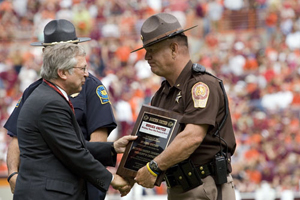
 President Charles W. Steger and a Montgomery President Charles W. Steger and a Montgomery
County Sheriff's Department officer.
|
|
| POCKET protection -| Researchers in the Pamplin College of Business are working on a computer program called POCKET, or Parental Online Consent for Kids' Electronic Transactions. The program allows parents to set privacy preferences for information their child can submit online. Afterward, POCKET will help to monitor the child's online activities. To learn more, go to www.pamplin.vt.edu/events/magazines.htm and click on the Spring 2006 issue. For more on children and the Internet, see "Hot Topic: Danger--children at play on the Internet." |
|
| Engineering students win competition
For the third year in a row, the College of Engineering's Autonomous Vehicle Team swept the international Intelligent Ground Vehicle Competition (IGVC), winning best and second-best overall and placing first in the three top event categories. The team of mechanical engineering students, which was awarded $15,000 in prize money, entered three of the 40 autonomous vehicles that competed in this year's IGVC. Thirty-three universities were represented at the event in which autonomous vehicles use on-board computer and navigational technologies to navigate obstacle courses and point-to-point destination courses without human intervention. The Tech team also won prizes for implementing both a new software standard for unmanned systems and the ability to point to a target at the end of a navigation run.
|
 |
 RESEARCH RESEARCH
E-textiles researcher honored at White House -|- For his research in the emerging field of electronic textiles, Thomas L. Martin, an associate professor in the Bradley Department of Electrical and Computer Engineering, was among 20 researchers recognized at the White House in July as recipients of the Presidential Early Career Award for Scientists and Engineers, the highest national honor for researchers in the early stages of their careers. Martin received a five-year National Science Foundation Faculty Early Career Development Program grant in 2005 for his work in designing e-textiles--cloth interwoven with electronic components--for use as wearable computers. The primary focus of his research is potential medical applications.
Professor studies aging families in Katrina aftermath -|- Aging families affected by Hurricane Katrina have experienced both physical and emotional problems in the aftermath of the disaster, and many yearn to "go back home," according to preliminary findings from Karen Roberto, director of Virginia Tech's Center for Gerontology; Tammy Henderson, formerly of Virginia Tech and the newly appointed director of the Institute for Gerontology at Oklahoma State University; and Yoshinori Kamo, a sociology professor from Louisiana State University. Funded by a grant from the National Science Foundation, the team is in the process of interviewing 100 aging families who have been displaced because of Hurricane Katrina, and 100 elderly long-term residents of Baton Rouge, La., who are coping with the overnight transformation of their community. Based on the data collected during this one-year project, the team will develop a research brief to augment or construct disaster prevention and intervention programs for aging families.
Blackberries an antioxidant powerhouse -|- Using the FRAP--ferric-reducing ability of plasma--assay method to measure and compile the expanded listing of total concentration of antioxidants for 1,113 foods and beverages, researchers at the University of Oslo, Virginia Tech, and the University of Minnesota report that the five foods and beverages having the highest antioxidant levels are: 1 cup of blackberries, 8 ounces of Welch's 100 percent grape juice, 1 cup of Ocean Mist artichoke hearts, 1 ounce of walnuts, and 1 cup of sliced strawberries. The study was published in the American Journal of Clinical Nutrition.
Model developed to study HIV/AIDS drug -|- Supported by a National Institutes of Health grant, Assistant Professor David Samuels and co-researchers at the Virginia Bioinformatics Institute have developed a computational model to simulate biochemical reactions that occur when the HIV/AIDS drug zidovudine (azidothymidine, or AZT) is metabolized in cells, including their mitochondria, under different metabolic conditions. Although used successfully as part of Highly Active Anti-Retroviral Therapy to control the level of the human immunodeficiency virus in HIV-infected individuals, AZT can cause debilitating side effects in some patients undergoing long-term use. The research seeks to determine if AZT's toxic side effects can eventually be minimized or even eliminated.
|


